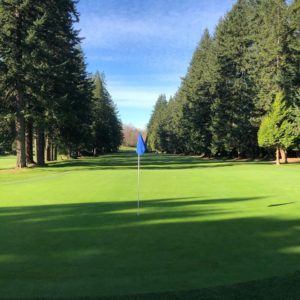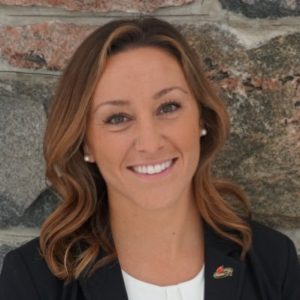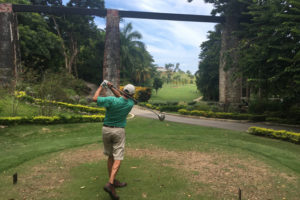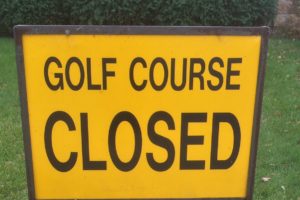There is little doubt that the only golf facilities operating today in Canada—those of British Columbia—are taking virtually every reasonable precaution to ensure the safety of their customers, members and staff from contracting COVID-19.
As of tomorrow, New Brunswick will join the parade. With no new cases in six days, the first phase of restarting that province’s economy will include allowing golf courses to open, while keeping their clubhouses and restaurants closed.
Odds are, if a facility is ready to go, it will eagerly welcome players to its fairways. Because in B.C., nearly every course that is permitted to operate is either currently open or in the process of opening. Some, in fact, never closed due to the virus, including Langley’s Redwoods GC, “although it has been strict in its social distancing rules (and) even kicked out two people for a high five,” according to B.C. news outlets 604now.com and CTV News.
Many facilities voluntarily closed their doors last month after B.C. Ministry of Health recommendations to do so—recommendations that were actually encouraged by B.C. Golf Chief Executive Officer Kris Jonasson. But those courses that had temporarily shuttered received the green light they were looking for last Thursday in the form of an open letter from Mark Lysyshyn, the Deputy Chief Medical Health Officer at Vancouver Coastal Health.
The letter reads as follows:
“To whom it may concern,
Re: Operating golf courses in the Vancouver Coastal Health region during the COVID-19 pandemic
The Provincial Health Officer has not issued any orders requiring the closure of golf courses as a result of the COVID-19 pandemic. Additionally, Vancouver Coastal Health has not recommended the closure of outdoor recreation facilities such as golf courses, parks or playgrounds.
If golf courses wish to operate in the current context, they must not operate their restaurant(s) for more than take out service, they must not offer personal services (eg. massage etc.) and must not host mass gatherings involving more than 50 people (but could have more than 50 people on site if social distancing is being observed).
They should provide hand washing facilities and ensure people are able to follow social distancing recommendations to stay 2 meters apart while on site. Staff or participants who are sick should be sent home.
Golf courses should follow their routine cleaning practices with enhanced cleaning of high-touch surfaces and shared items such as rental equipment. There may be additional measures specific to the golf environment that golf courses can implement to further reduce risk COVID-19 transmission.
For further information on COVID-19, please visit: www.vch.ca/covid-19
Please feel free to share this information with other golf courses in the Vancouver Coastal Health region.”
LONE HOLDOUT?
Now it’s not as though B.C. Health is necessarily encouraging golf enthusiasts to run to their nearest teeing ground. As recent as nine days ago, Interior Health Authority Chief Medical Health Officer Dr. Sue Pollock suggested to CBC News that golf was not a great idea at the moment. “Right now, we are really encouraging people to certainly spend time outdoors with their immediate families—those in their household—and to stay closer to home to do that. Try to do that through just walks in your neighbourhood or biking, rather than going to settings like golf courses.”
B.C. Golf’s Jonasson echoes those sentiments. “While it is possible to minimize the risks to golfers from Covid-19, it is not possible to eliminate the risk,” he concedes. “In the current environment where health officials and government leaders are urging Canadians to stay home, it is not appropriate for British Columbia Golf to not follow that advice.”

Dating to 1929, Vancouver’s University GC is playing it safe while its competitors are open for play.
Nevertheless, with the exception of municipal courses in B.C., and the odd private course (such as Seymour G&CC in North Vancouver), there appears to be just one lone holdout among eligible public-access facilities in the region: University Golf Club, an A.V. Macan design located in the heart of the Pacific Spirit Park on University Endowment Lands and privately owned by the Musqueam Indian band. The facility is hugely popular, averaging between 50,000 and 55,000 rounds per year, so some public players aren’t happy with the club’s position to remain closed. In response to some public player blowback on its Facebook page, University GC felt compelled to respond: “With where society is at this point in time, we would never take the position of ‘what other courses are doing.’ And it is never about the competition. That is not important in the least.”
What is important is taking their time to evaluate protocols before reopening their doors, explains General Manager Michael Mather. “We’ve watched clubs that have opened in and around the city of Vancouver, and we’re keeping an eye on how it goes and best practices,” Mather says. “The golf industry has done a very good job of the things they’ve put in place, including a very thorough consultation process with other operators, from the Golf Association of B.C. to the National Golf Course Owners Association, to the Club Managers Association to the PGA of Canada, the Golf Course Superintendents Association—everyone has worked well together to come up with a playbook of the best ways to operate safely for staff and customers.”
But the powers that be at University GC are not comfortable pulling the trigger just yet. “We made the decision to close end-of-day on March 19,” says Mather, whose facility employs roughly 50 full-time staff, with upwards of 150 (including part-time) at the height of the season, with weddings and other functions on the plate. “For the staff that were here in March—from the full-time to permanent part-time, to some others who were just starting to come back, our ownership has kept everyone on payroll, which is amazing.
“We’re working very diligently behind the scenes with our management team of putting together a very detailed playbook, just to make sure we check all the boxes and do it consistently from the day we open,” Mather notes. “Are we being overly cautious? I think we’re just trying to be very smart and very detailed so that we do it methodically—what are the shifts and hours of operation going to be? How many people are going in one department at one time? There are so many little things to look at to do this properly seven days a week.
“It has to do with the culture of the entire group that’s here, from front line to dishwasher and janitor,” Mather adds. “And that extends to our ownership group, looking at the big picture. This is just how we do things. I’m not saying other facilities are wrong by being open or being closed—that’s a completely personal decision with how every individual wants to operate through this, right down to the person who says they want to ride the bike, while someone else doesn’t want to leave their yard.”
How long will they wait? “I think we’re getting closer in our own comfort level, where society is, where the virus is at, what protocols are in place,” Mather says. “We just don’t know that date yet. B.C. has done a very good job of being in control and avoiding too many cases, but I think mid-May could be the earliest we’d look at opening. But when the time comes, it will be awesome. And we wish every operation already open to be safe and successful. From what I can see, they’re doing a pretty good job and my hat’s off to them.
Meanwhile in Ontario
In Ontario, however, golf courses remain shut, and patience is wearing thin for many public players, some of whom—citing golf as an ideal physical distancing sport—have started petitions to pressure the provincial government to release Ontario golf facilities from their shackles.

PGA of Ontario Executive Director Melanie van der Hoop
However, PGA of Ontario Executive Director Melanie van der Hoop advises against that strategy. “We are not advocating for our courses to be open right now, but instead for the government to review our business once they decide it is safe to reopen certain sectors of the province,” van der Hoop notes. “I’m not confident that petitioning is the best approach to warrant the result we’re looking for. These are very sensitive times and, as such, it’s imperative that we remain compassionate and professional in our approach and in our messaging as an industry.
“During this crisis, the first priority of Ontario’s We Are Golf, which represents all partners in the Ontario golf industry, is the health and safety of all of our stakeholders,” van der Hoop stresses. “At the same time, golf is naturally aligned to the principles of safe social distancing, and with some key precautions can provide Ontarians with some much-needed exercise, mental stimulation and safe social time with family or friends. We believe these principles align well with the role of the Ontario Jobs and Recovery Committee.
“With this in mind, all of the Ontario We Are Golf partners continue to work very closely together to develop a clear plan for a return to golf within a safe and healthy environment,” says van der Hoop, whose organization features “best practices” on the regularly updated Community Connection page of its website, with resources that also include free webinars and education.
“We are working very closely with the appropriate government resources to share this messaging and help them understand what a clear path to safe golf—and the related economic benefits—looks like,” she notes. “The clear goal is to ensure that golf courses are among the first allowable activities to open for business when economic recovery strategies are put in place and stay-at-home guidelines start to be lifted in Ontario.”




1 Comment
Leave your reply.